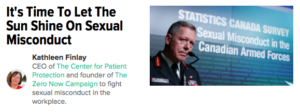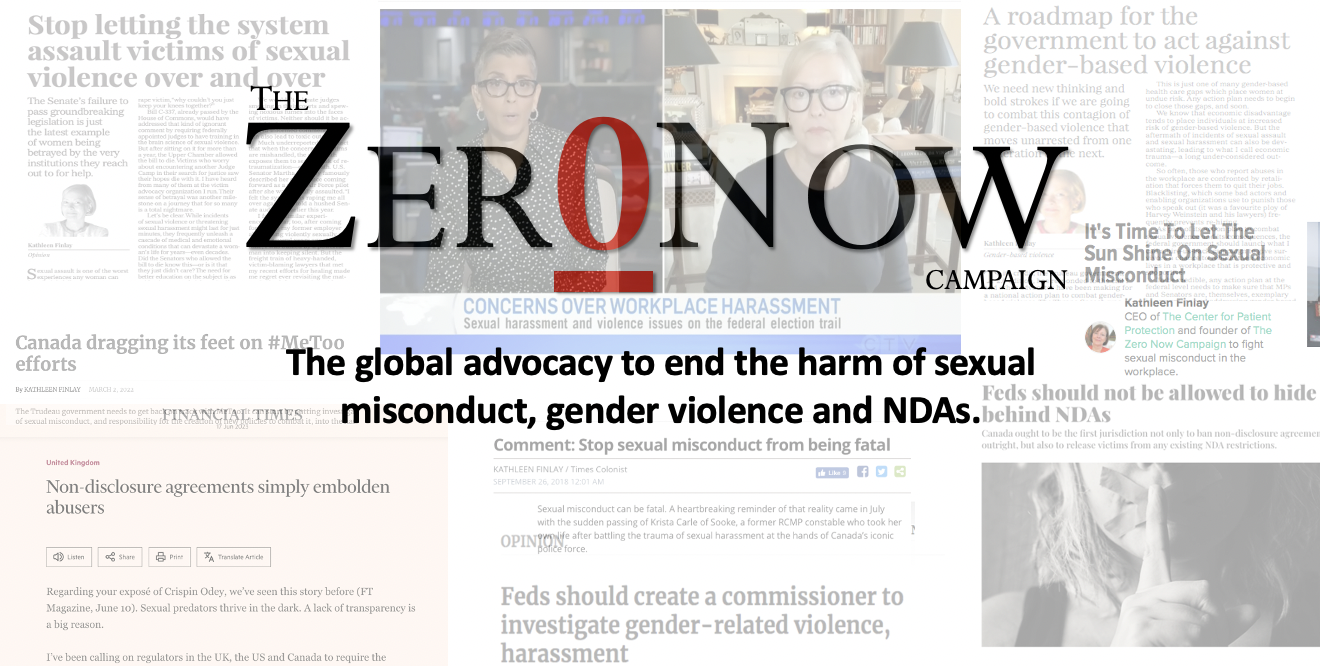- Home
- It’s Time to Let the Sun Shine on Sexual Misconduct
It’s Time to Let the Sun Shine on Sexual Misconduct
Published in The Huffington Post February 26, 2018
 We have no way of measuring which federal entities are actually practicing a zero-tolerance policy when it comes to sexual misconduct
We have no way of measuring which federal entities are actually practicing a zero-tolerance policy when it comes to sexual misconduct
by Kathleen Finlay The Canadian government is in the midst of updating its laws to more fully address sexual harassment in federally regulated workplaces, and to finally bring parliamentary and political staff under such protections. Known as Bill C-65, the proposed law moves a step forward — forward into the last century perhaps — in setting out practices, such as the obligation to investigate complaints, that have long been established elsewhere. But it falls far short of being the 21st century model it should be, and what this period of “reckoning” demands. Just take the case of the Royal Canadian Mounted Police. Despite being hit by an avalanche of sexual misconduct claims and scandals over the past several years, it is still not required to provide specific details on the number of settlements agreed to or the amount of tax dollars used to resolve these complaints. In the United States, lack of transparency involving members of Congress sparked political outrage late last year when it was discovered that taxpayers were footing the bill for a secret “hush” fund to pay for sexual misconduct settlements. It’s pretty obvious this has been a subject on which most politicians have not wanted to cast any sunlight. This is not serving the cause of zero-tolerance. There is more information available on the performance of kitchen coffee machines than there is about sexual misconduct in our public institutions, which we all pay for. Do you really want to be picking up the tab for financial settlements involving bad actors in the federal workplace and on Parliament Hill? Unless you’re a troll in Russia trying to make mischief, the answer is probably no. I recently emailed a number of MPs of all parties — all of them women — who have shown an interest in Bill C-65, urging them to adopt what I call a sunshine law for sexual misconduct. Every one responded — with an automatic reply that told me they get a lot of email and not to expect a response from a real human being. There was no support, encouragement or interest in the auto-reply. Such a cold, impersonal response was a bit of a gut punch. This is a rare opportunity for the federal government under Prime Minister Justin Trudeau to show transformative leadership in dealing with conduct that causes too much harm in our workplaces because it goes on out of view and behind closed doors. It’s time the doors were opened. It’s said that sunlight is the best disinfectant for public wrongdoing. That’s why we call our proposal a sunshine law for sexual misconduct. It is one that should be adopted by governments at every level in Canada and the U.S., and should be replicated in all our universities, hospitals and progressive private sector organizations. A sunshine law for sexual misconduct represents a 21st century approach to a systemic workplace problem that desperately needs fresh thinking. It could begin to make a real difference in protecting women. Let’s all get behind it, and throw open the doors! CHRIS WATTIE / REUTERS
CHRIS WATTIE / REUTERS
